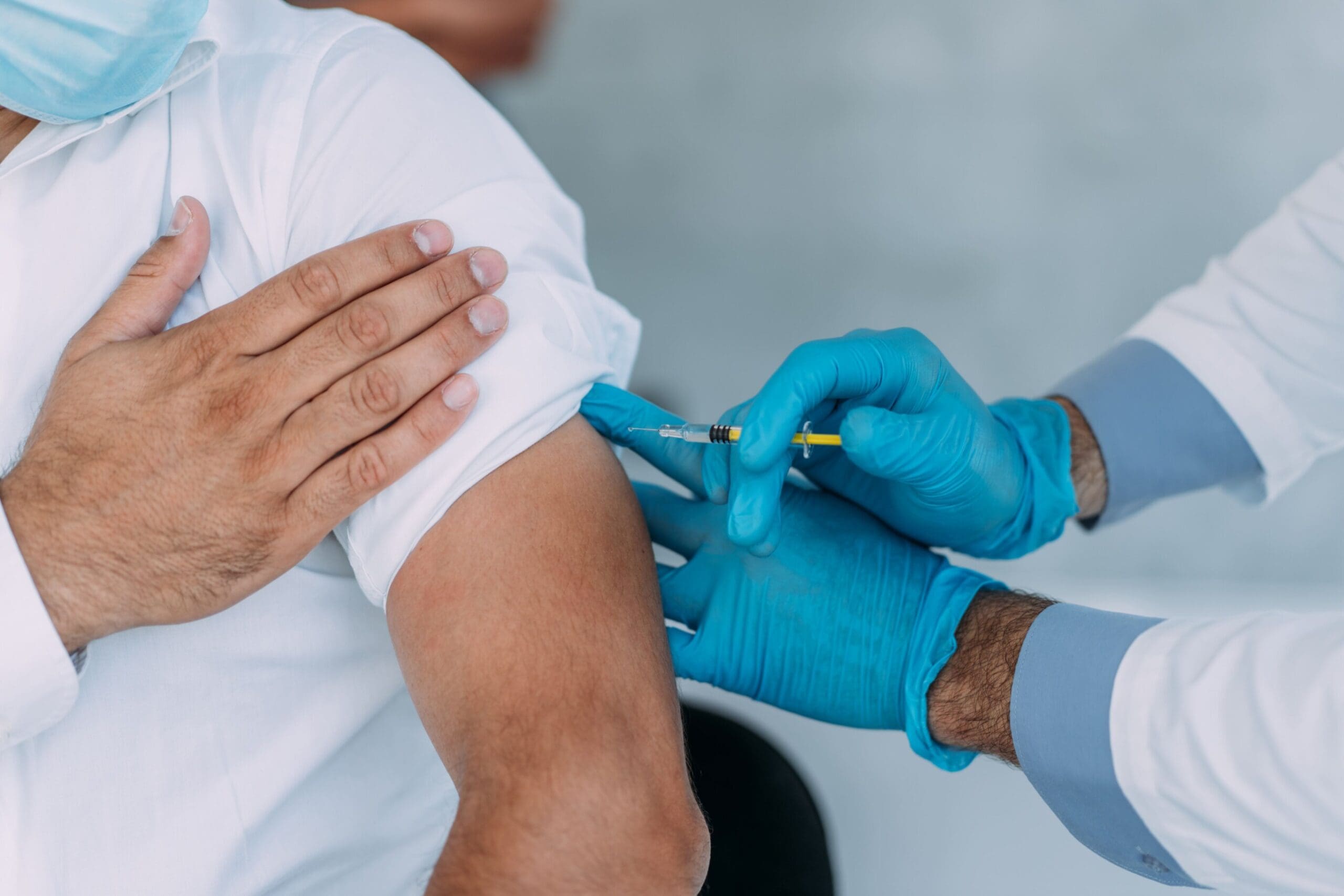Scientists have been trying to develop an addiction vaccine since the 1970s. The complex nature of addiction presents them with challenges that they are still trying to overcome. Let’s have a closer look at the status quo of this research process.
While Operation Warp Speed, the endeavour that aimed to accelerate the development of a COVID-19 vaccine, was a race against time and urged scientists to deliver results (and vaccines) in less than a year, research into another potentially deadly condition has been underway for the past five decades. With the number of drug-related deaths still climbing annually and more than half a million deaths resulting from alcohol and illicit drug use each year[i], no one is denying the urgent need for new treatment options in the field of substance use disorder (SUD). So, where do we currently stand on a vaccine against addiction?
Vaccine vs medication
When it comes to medical treatment of addiction, the medicine cabinet of a person suffering from SUD still is only sparsely stocked. The few options available are made up of a handful of agents to treat alcohol (e. g. naltrexone, acamprosate, disulfiram) or opioid (e. g. methadone, buprenorphine, naltrexone) use disorders but none that work against cocaine, methamphetamine and cannabis. Still, approximately 50 % of those who use these medications relapse after about six months. Furthermore, no current medication meets the complex challenge of accomplishing three things on its own: avoiding withdrawal symptoms, blocking the high, and reducing the craving.[ii]
This is where the potential vaccine comes in and why its development is still engaging researchers around the world: a vaccine could prevent a high in the first place and therefore would – at least to a certain extent – moot the problem of craving and withdrawal symptoms. Further advantages would include a long duration of protection, a reduction of toxicity to organs as well as the redundancy of detox or withdrawal before the vaccination which currently is necessary with most medications.
How addiction vaccine would work …
Basically, addiction vaccine has the same aim as other vaccines. In the case of a virus, for example, the vaccine would spur the immune system to produce antibodies that target and neutralize it, thus preventing an infection. The antibodies induced by addiction vaccine would latch onto the drug molecule to make it too bulky to pass the blood-brain barrier. And since the opioid doesn’t reach the brain, it won’t get the person high. This means that, unlike with a “conventional” vaccine that is being given in advance of coming in contact with a virus, addicted persons would receive the vaccine only after they have developed a dependency on the substance. In other words: addiction vaccine is no magic bullet that prevents addiction. It would aim to prevent relapses.
… and why its development is so tricky
Before a vaccine – or any medication, that is – can reach a patient, it needs to pass 4 phases of rigorous testing to ensure that it is safe and effective, as well as to ascertain the correct dosage[iii]. Research on the development of addiction vaccines goes back to the 1970s but since then, none of the experimental vaccines has passed Phase 3. While tests with rodents who were given the test vaccine often showed promising results, these repeatedly proved inconclusive and ineffective with human test subjects.
Some difficulties are unique to each abused substance:
In the case of alcohol addiction, the ethanol molecules are so small that the immune system fails to “spot” them and therefore does not produce enough antibodies; cocaine addicts could simply take more of the drug to counteract the vaccine currently in development; and meth molecules have such stamina that they stay in the system so long that they outlast the antibodies.[iv]
Additionally, researchers face general challenges such as the duration of immunity (vaccines currently being tested would last for only 3 to 6 months with boosters required every 2 to 3 weeks following the initial shot) and high costs. Studies show that the development of a new drug from day 1 to market costs $2.6 billion[v]. While medication for diseases that affect a large number of people tends to pay off, the majority of those suffering from SUD experience natural recovery, thus marking research into addiction vaccines down as a financially unattractive endeavour. Adding to this, the still existing “stigma of addiction” creates another hurdle in the way of research since it discourages funding, especially for treatments of illicit drug abuse.
Conclusion
“Is there any good news at all?”, you might ask. Yes, because despite the many setbacks over the past decades, researchers and scientists decided not to give up and still believe that they eventually will succeed in developing addiction vaccines. If you follow the news on this topic – and we will update this article regularly – you will see that there are continuously new promising findings.
Still, as we know that a vaccine won’t be a magic bullet, and with no current medication available that deals efficiently with withdrawal symptoms, cravings, and the high all in one, we will continue to address addiction the best possible way: with treatment. Please do not hesitate to contact us to learn more about our personalised treatment options that will help you embark on your journey to recovery.
Sources
[i] UN World Drug Report 2019, https://wdr.unodc.org/wdr2019/en/exsum.html. Accessed 7 Dec 2023.
[ii] Kampman, K. Penn Medicine Neuroscience Center. (2016), https://drugabuse.com/blog/why-dont-we-have-addiction-vaccines/. Accessed 7 Dec 2023.
[iii] Center of Disease Control and Prevention (CDC), https://www.cdc.gov/vaccines/basics/test-approve.html. Accessed 7 Dec 2023.
[iv] Brashier DB, Sharma AK, Akhoon N. Are therapeutic vaccines an answer to the global problem of drug and alcohol abuse? Indian J Pharmacol. 2016 Sep-Oct;48(5):487-489. doi: 10.4103/0253-7613.190717. PMID: 27721531; PMCID: PMC5051239.
[v] DiMasi JA, Grabowski HG, Hansen RW. Innovation in the pharmaceutical industry: new estimates of R&D costs. Boston: Tufts Center for the Study of Drug Development, November 18, 2014, https://pubmed.ncbi.nlm.nih.gov/26928437/. Accessed 7 Dec 2023.




0 Comments